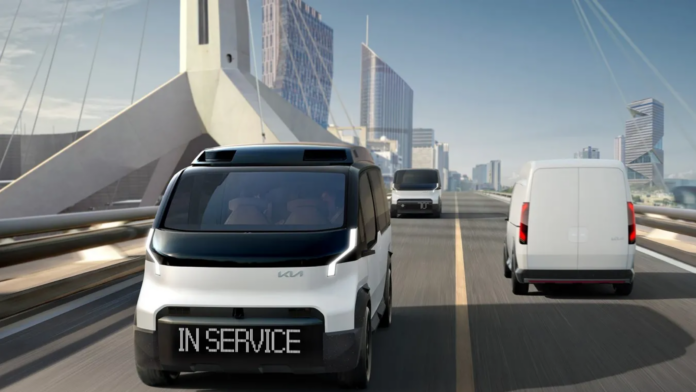Kia Motors is making waves in the electric vehicle (EV) space, and their latest announcement at CES 2024 has the industry buzzing. Fresh off a successful year with their passenger EVs, Kia is now setting its sights on electrifying the business world. Their newly unveiled lineup includes a versatile range of electric vans, trucks, and vehicles designed for ride-hailing and last-mile delivery, all built on an innovative modular platform.
This move isn’t just a leap into the future of transportation; it’s a strategic play to cement Kia’s position in the rapidly evolving world of commercial electric mobility. The lineup showcases Kia’s commitment to sustainable and efficient transportation solutions, tailored for businesses looking to make an eco-friendly switch.
The heart of this new lineup lies in its modular design. Taking cues from the popular skateboard-style platforms that are reshaping the EV industry, Kia’s approach offers both flexibility and adaptability. The vehicles feature fixed driver cabs with the rest of the cabin designed to be interchangeable – a concept Kia has aptly named “life modules.” These modules connect to the chassis using a combination of mechanical couplings and electromagnets, offering versatility for various business needs.
Details about the technical specifications are still under wraps, but Kia’s investment in a dedicated plant in South Korea, set to be operational by 2025, speaks volumes about their commitment. The plant is expected to churn out an initial annual capacity of 150,000 vehicles, with potential expansion up to 300,000 units worldwide.
The first to roll off this new production line will be the Kia PV5. Priced at around $35,000, this three-row van boasts a futuristic design and is set to hit the streets in 2025. Following closely will be the larger PV7, scheduled for 2027, and a compact model, the PV1. Additionally, Kia is teasing a robotaxi version slated for 2028, hinting at a future where these EVs might become accessible to everyday consumers.
Design-wise, Kia’s commercial EVs present a stark, utilitarian aesthetic. They don’t possess the quirky charm of Hyundai’s Staria van, but they’re pragmatic, designed for function over form. This approach draws parallels with Canoo, the EV startup known for its functional vehicle designs. Interestingly, Hyundai and Canoo’s past partnership, which ended under mysterious circumstances, brings an intriguing backdrop to Kia’s current direction in the EV market.
Kia’s partnership with Uber, announced during the CES press conference, is a significant milestone. This collaboration is not just a win for Kia but a testament to the growing demand for sustainable transportation solutions in the ride-hailing sector.
In conclusion, Kia’s foray into the commercial EV market is more than just a new product line; it’s a strategic shift towards a more sustainable and efficient future in transportation. As Kia prepares to launch these vehicles, they’re not only addressing the needs of businesses today but also shaping the future of mobility. Their vision of adaptable, efficient, and sustainable commercial vehicles could redefine how businesses think about transportation. With Kia’s new lineup, the road to the future looks electric.











